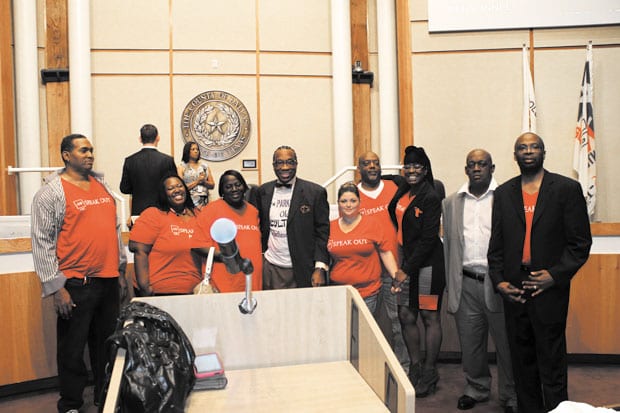While AHF continues its suit against Dallas County for a share of the grant, former employees file a lawsuit charging illegal kickbacks

Dallas AIDS Healthcare Foundation staff and patients who attended the April 7 Dallas County Commissioners Court meeting talked to Commissioner John Wiley Price after the meeting. (David Taffet/Dallas Voice)
DAVID TAFFET | Senior Staff Writer
Dallas County Commissioners Court approved distribution of Ryan White funding on April 7 without including funding for AIDS Healthcare Foundation.
The fiscal year for Ryan White grants began March 1, so the delay in approval along with the county’s normal six-to-eight-week turnaround in processing payments means AIDS service organizations will wait up to three months to be paid for services provided. The executive director of one agency expressed concern about the ability of some agencies to add new clients had the county continued to delay funding approval.
Because the preliminary awards list excluded AHF, has the agency filed a lawsuit against Dallas County. AHF Texas Regional Director Bret Camp said the lawsuit will proceed.
The director of another AIDS service organization, who also asked not to be identified, said the Request for Proposal grant application specified that to qualify, an agency had to be operating in Dallas County for at least three years at the time the application was submitted. AHF opened its clinic at Medical City just over two years ago, in December 2012.
After the vote at Commissioners Court, Camp said, “I’m glad funding will get out.”
Camp, who worked for Resource Center for years before joining AHF, said he was also worried about other agencies’ ability to continue some services without the money.
AHF isn’t shy about using the courts — as either the plaintiff or defendant. In Tarrant County, AHF was initially denied funding as well, but after the agency filed a lawsuit there, county commissioners voted to include AHF in the funding distribution. AHF also has a similar lawsuit pending against Palm Beach County, Fla. for Ryan White funding.
In addition, three ex-employees have litigation pending against the organization, charging it with using a system of incentive payments to reward patients and employees for using AHF’s clinics and pharmacies, thereby inflating the number of patients it could bill Medicare and Medicaid for treating. The suit, filed in Florida, charges AHF with violating the state’s anti-kickback law.
The three claimed whistleblower status and assert retaliation by the agency when they were fired after filing suit.
But AHF spokesman Ged Kenslea said the three plaintiffs want to try their case in the media after the federal government and Florida declined to intervene in February.
He said the organization is aggressive in finding people who are HIV-positive and getting them into care.
“With more than 60 percent of the 1.2 million people living with HIV/AIDS in the United States currently not in regular medical care and treatment, it remains core to AHF’s mission to try and reduce that number,” Kenslea said in an email.
He denied any wrongdoing by AHF and called the organization’s approach “pro-active” by finding and “linking HIV-positive individuals to lifesaving care and treatment,” which he called critical to stopping HIV.
“We look forward to the opportunity to rebut these baseless charges in court,” Kenslea said.
Offering inducements is not illegal, but there are rules that have to be carefully followed. If Medicare and Medicaid find any wrongdoing, AHF could lose the ability to bill the government and private insurance companies.
AIDS Arms Executive Director John Carlo said his agency uses incentives for certain programs.
“We have programs that offer gift card incentives targeting testing programs and attendance at educational programs,” Carlo said.
He said those incentives are covered by grants from the Centers for Disease Control, the National Institute of Health and other federal agencies that monitor the distribution of those funds closely.
“We are very cautious in the administration of these things,” Carlo said. “We don’t make system-wide incentive payments.”
Meanwhile, Ryan White money will begin to go to other agencies while AHF’s lawsuit proceeds.
The awards made this week account for about 80 percent of funds available. Most Ryan White funds are distributed once an agency bills the county for services provided.
Parkland received the largest grant with $3.8 million benefiting mostly outpatient medical care and medical case management.
The largest part of Resource Center’s allocation — more than $1 million — goes toward its insurance assistance program. The dental program at its Nelson Tebedo Clinic will receive $488,000.
Almost half of AIDS Arms award is for outpatient medical care while most of the money AIDS Interfaith Network will receive benefits its medical transportation programs.
Most of Legacy Counseling Center’s award is for substance abuse and mental health counseling.
Health Services of North Texas, which operates in Denton and Collin counties but receives its Ryan White money through Dallas County, received more than $1 million spread over eight service categories from case management to outpatient medical care and insurance assistance.
………………………..
Distribution Ryan White Part A
AIDS Arms…………………………………………………$1,679,911
AIDS Interfaith Network……………………………..$489,767
AIDS Services of Dallas……………………………….$463,573
Dallas County Health Division……………………..$196,876
Dallas County Hospital District (Parkland)……$3,824,927
Dallas Legal Hospice………………………………….$53,321
Dental Health Programs………………………………$447,978
Health Services of North Texas…………………….$1,022,596
Legacy Counseling Center……………………………$165,597
Open Arms (Bryan’s House)………………………..$65,772
Resource Center…………………………………………$1,811,824
TBD………………………………………………………… $31,788
Total…………………………………………………………$10,253,930
This article appeared in the Dallas Voice print edition April 10, 2015.


